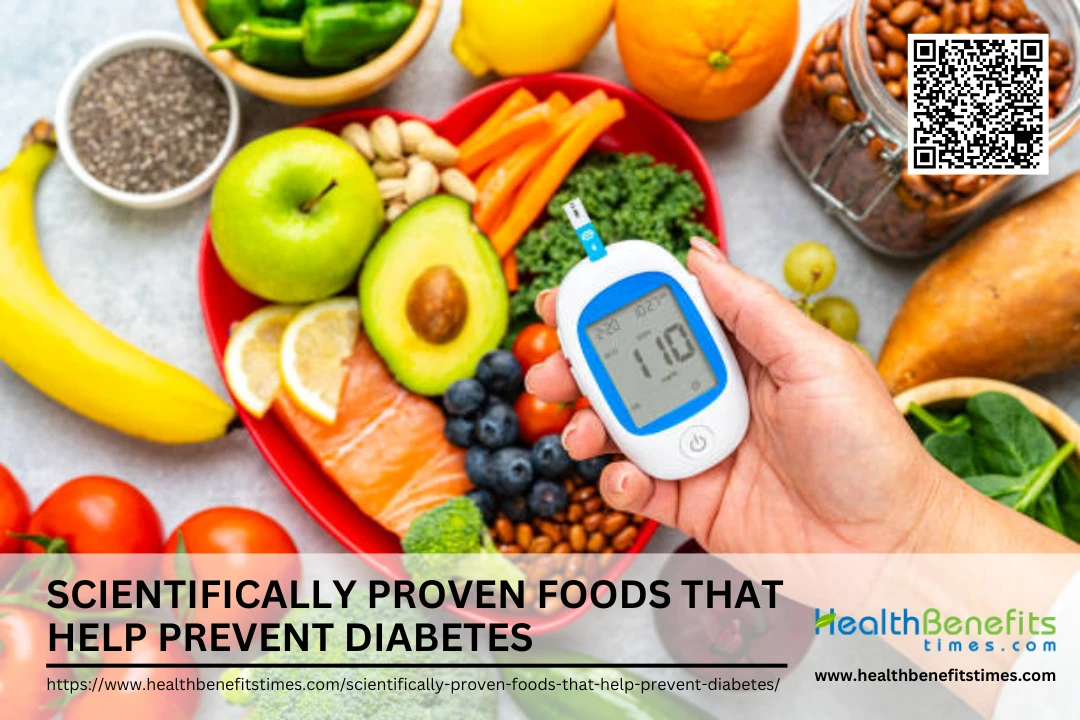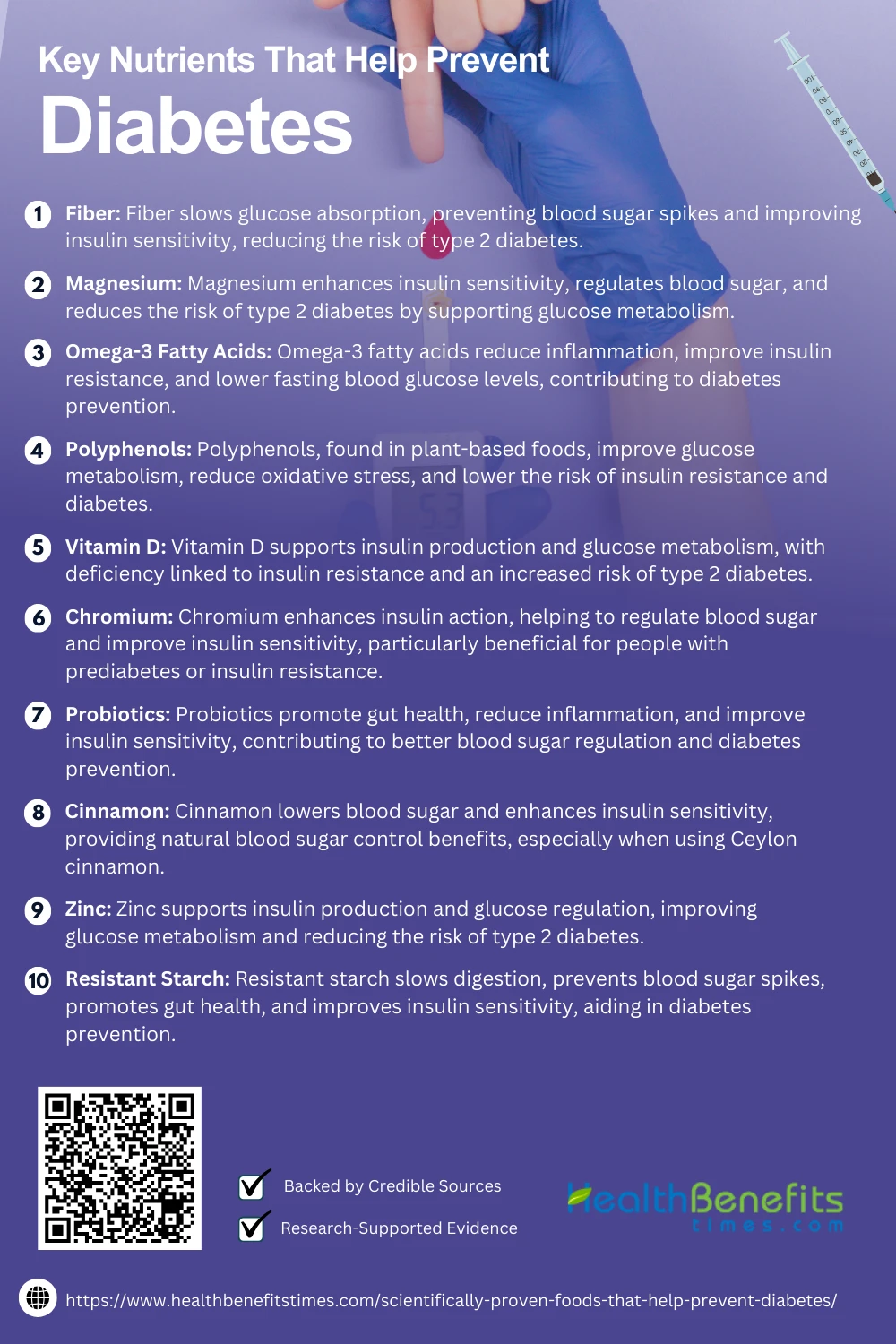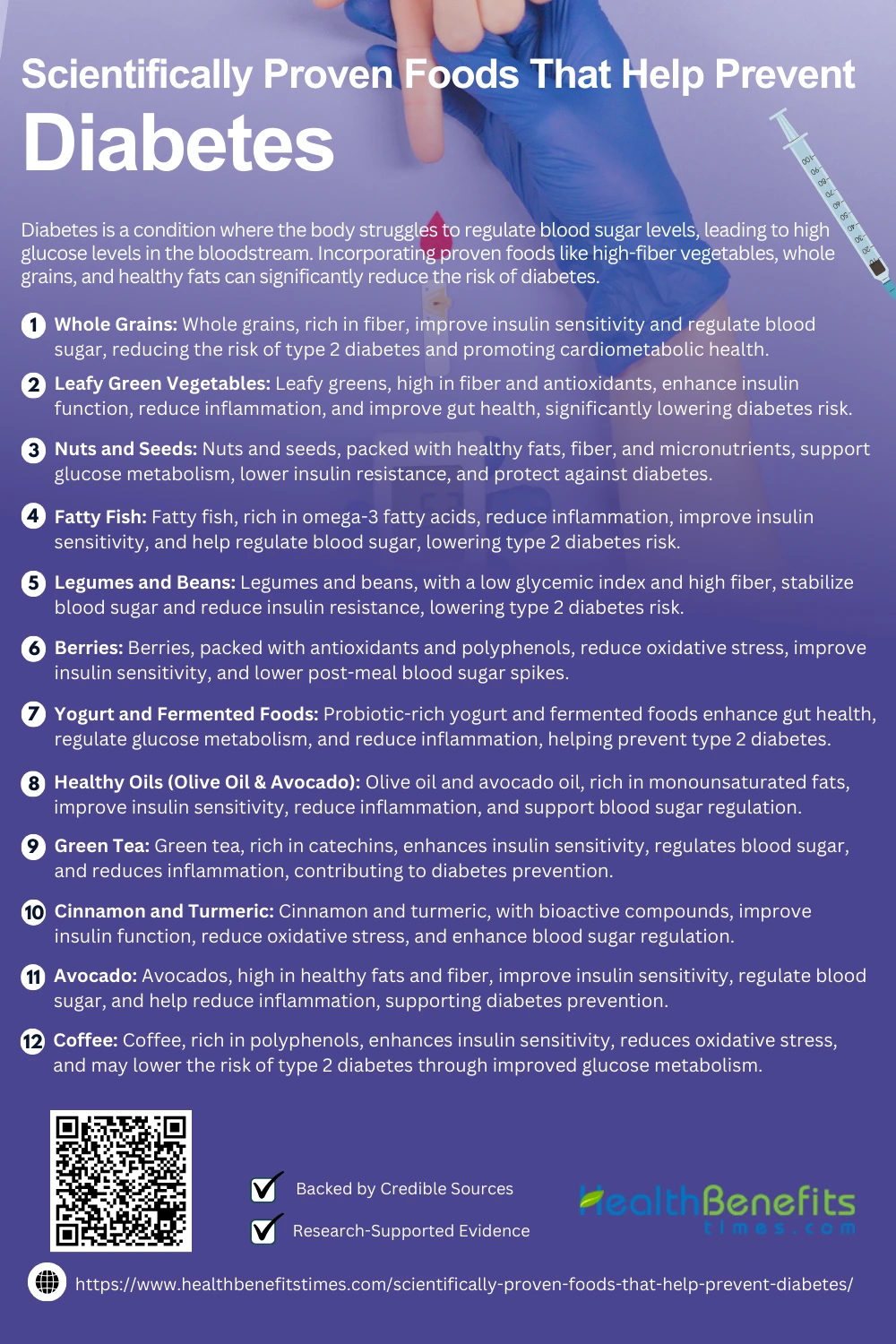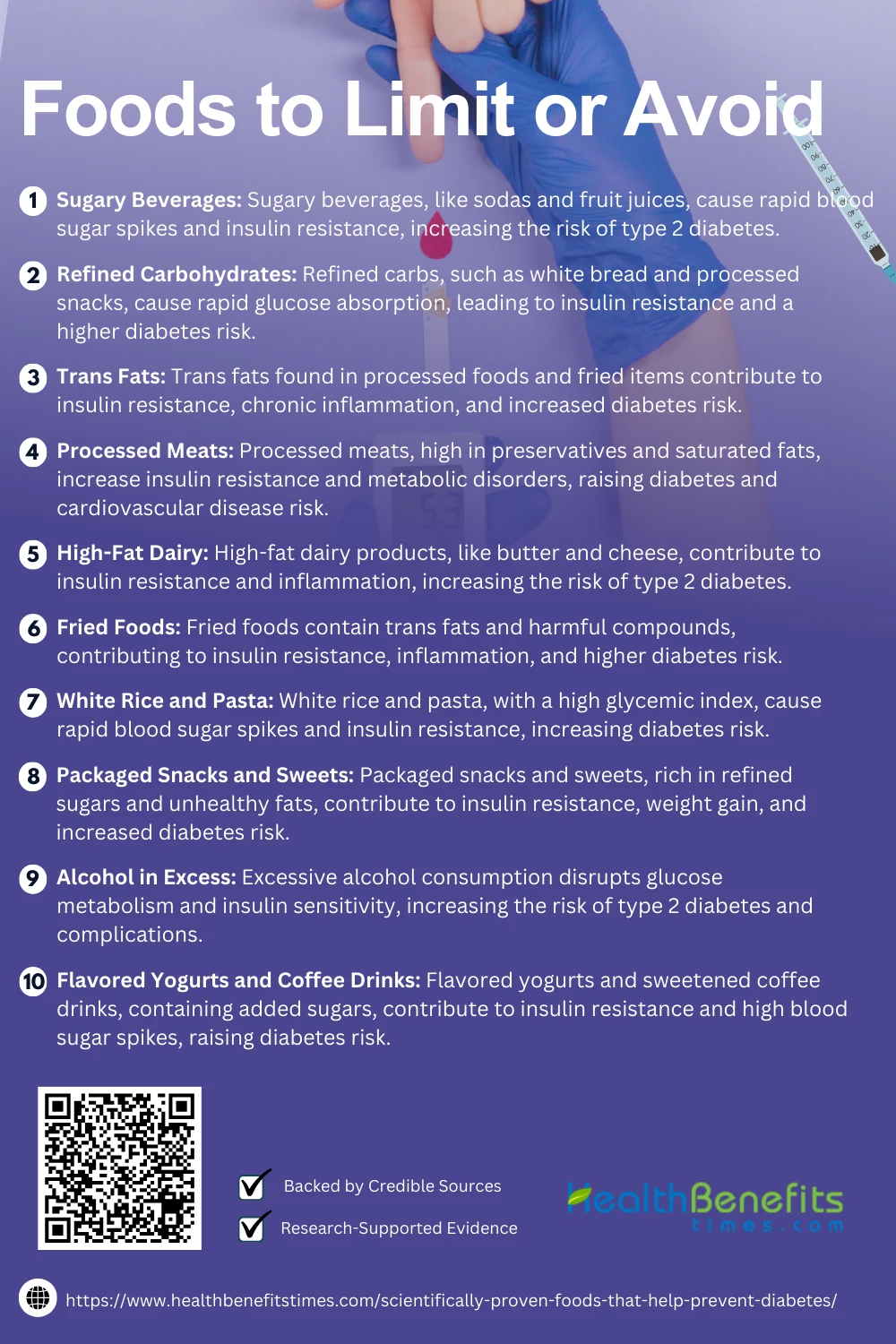- Diabetes is a condition where the body struggles to regulate blood sugar levels, leading to high glucose levels in the bloodstream.
- Incorporating proven foods like high-fiber vegetables, whole grains, and healthy fats can significantly reduce the risk of diabetes.
- Spices like cinnamon and turmeric, along with antioxidants from fruits and vegetables, support insulin sensitivity and blood sugar control.
 Diabetes is a chronic metabolic disorder characterized by high blood sugar levels due to inadequate insulin production or resistance to insulin action. Maintaining a healthy diet plays a crucial role in preventing type 2 diabetes, a condition that has become a global epidemic. Scientific studies have demonstrated that specific foods can improve insulin sensitivity, reduce inflammation, and regulate blood glucose levels. For example, whole grains have been found to lower the risk of developing diabetes by improving insulin response. Similarly, leafy green vegetables, rich in fiber and antioxidants, have been linked to reduced diabetes incidence. Studies also indicate that consuming nuts and seeds, which contain healthy fats and proteins, can stabilize blood sugar levels. Furthermore, the omega-3 fatty acids in fatty fish help decrease insulin resistance and inflammation, contributing to better metabolic health.
Diabetes is a chronic metabolic disorder characterized by high blood sugar levels due to inadequate insulin production or resistance to insulin action. Maintaining a healthy diet plays a crucial role in preventing type 2 diabetes, a condition that has become a global epidemic. Scientific studies have demonstrated that specific foods can improve insulin sensitivity, reduce inflammation, and regulate blood glucose levels. For example, whole grains have been found to lower the risk of developing diabetes by improving insulin response. Similarly, leafy green vegetables, rich in fiber and antioxidants, have been linked to reduced diabetes incidence. Studies also indicate that consuming nuts and seeds, which contain healthy fats and proteins, can stabilize blood sugar levels. Furthermore, the omega-3 fatty acids in fatty fish help decrease insulin resistance and inflammation, contributing to better metabolic health.
Legumes and beans, known for their low glycemic index, have also been found to promote better glucose control and reduce the likelihood of developing diabetes. Additionally, fermented foods such as yogurt and kimchi improve gut microbiota, which is closely linked to glucose metabolism. Spices like cinnamon and turmeric have shown significant benefits in regulating blood sugar and improving insulin sensitivity. Moreover, research suggests that the polyphenols found in green tea can reduce diabetes risk by enhancing glucose metabolism. Finally, dietary interventions that emphasize healthy fats, such as olive oil and avocados, have been linked to better long-term diabetes prevention.
Understanding Diabetes and Its Risk Factors
Diabetes is a chronic condition that occurs when the body either fails to produce enough insulin (Type 1 diabetes) or becomes resistant to insulin’s effects (Type 2 diabetes). Type 1 diabetes is an autoimmune disorder, whereas Type 2 diabetes, the most common form, is primarily associated with lifestyle and genetic factors.
Several risk factors contribute to the development of Type 2 diabetes, including obesity, physical inactivity, poor diet, and family history. Additionally, conditions such as hypertension and high cholesterol levels significantly increase the likelihood of developing diabetes, as they are closely linked to metabolic syndrome.
Insulin resistance is a key driver of Type 2 diabetes, where the body’s cells become less responsive to insulin, leading to elevated blood sugar levels. This condition, if left unmanaged, can result in complications such as cardiovascular disease and nerve damage. Studies show that dietary changes, physical activity, and weight management can help improve insulin sensitivity, ultimately reducing diabetes risk.
Key Nutrients That Help Prevent Diabetes
Scientific research has identified several key nutrients that play an essential role in preventing type 2 diabetes by improving insulin sensitivity, reducing inflammation, and stabilizing blood sugar levels. Below is a comprehensive breakdown of these nutrients and how they contribute to diabetes prevention.
1. Fiber
Fiber is a crucial nutrient for diabetes prevention as it slows down glucose absorption, preventing rapid spikes in blood sugar levels. Soluble fiber, found in foods like oats, beans, and apples, forms a gel-like substance in the gut, slowing digestion and enhancing satiety. Insoluble fiber, present in whole grains and vegetables, aids in gut health and regulates bowel movements. Studies suggest that individuals consuming high-fiber diets have a significantly lower risk of developing type 2 diabetes due to its role in improving insulin sensitivity and reducing inflammation.
2. Magnesium
Magnesium is an essential mineral that plays a key role in glucose metabolism and insulin function. It helps regulate blood sugar levels by enhancing insulin sensitivity and reducing the risk of insulin resistance. Magnesium deficiency has been linked to an increased likelihood of type 2 diabetes. Foods rich in magnesium include nuts (almonds, cashews), seeds, whole grains, and leafy greens like spinach and kale. Research has demonstrated that adequate magnesium intake is associated with a reduced incidence of diabetes, making it an important nutrient for metabolic health.
3. Omega-3 Fatty Acids
Omega-3 fatty acids are polyunsaturated fats that reduce inflammation and improve insulin resistance, two key factors in diabetes prevention. Found in fatty fish like salmon, sardines, and mackerel, as well as plant sources like flaxseeds and walnuts, omega-3s support heart health and metabolic function. Studies indicate that omega-3 fatty acids contribute to lower fasting blood glucose levels and improved lipid profiles, reducing the risk of type 2 diabetes and its complications.
4. Polyphenols
Polyphenols are plant-based antioxidants that improve glucose metabolism and insulin function. They are found in berries, green tea, dark chocolate, and red wine (in moderation). These compounds reduce oxidative stress and inflammation, both of which are linked to diabetes progression. Clinical studies show that polyphenol-rich diets enhance blood sugar control and lower the risk of insulin resistance, making them an essential component of a diabetes-preventive diet.
5. Vitamin D
Vitamin D is vital for insulin production and glucose metabolism. Deficiency in vitamin D is linked to insulin resistance and an increased risk of type 2 diabetes. Natural sources include sun exposure, fatty fish, fortified dairy products, and egg yolks. Research suggests that vitamin D supplementation can enhance insulin sensitivity and reduce inflammation, providing a protective effect against diabetes.
6. Chromium
Chromium is a trace mineral that plays a key role in glucose metabolism by enhancing insulin action. It helps regulate blood sugar levels and may improve insulin sensitivity. Chromium is found in whole grains, nuts, green beans, and broccoli. Some studies suggest that chromium supplementation can help people with insulin resistance or prediabetes manage their blood sugar levels more effectively.
7. Probiotics
Probiotics are beneficial bacteria that promote gut health and have been linked to improved insulin sensitivity. A balanced gut microbiome is essential for reducing inflammation and regulating blood sugar levels. Foods rich in probiotics include yogurt (with live active cultures), kefir, kimchi, and sauerkraut. Research suggests that probiotics can lower blood sugar levels, decrease inflammation, and improve overall metabolic health, making them beneficial for diabetes prevention.
8. Cinnamon
Cinnamon contains bioactive compounds that can lower blood sugar levels and enhance insulin sensitivity. This spice has been shown to reduce fasting blood sugar levels and improve the efficiency of insulin in transporting glucose into cells. Ceylon cinnamon is preferred over Cassia cinnamon due to its lower coumarin content. Adding cinnamon to meals, coffee, or smoothies may provide natural blood sugar control benefits.
9. Zinc
Zinc is essential for insulin production and plays a role in glucose regulation. It helps pancreatic beta cells function properly and enhances the body’s ability to manage blood sugar. Zinc-rich foods include shellfish, pumpkin seeds, legumes, and lean meats. Studies have found that zinc supplementation can improve glucose metabolism and insulin function, reducing the risk of type 2 diabetes.
10. Resistant Starch
Resistant starch is a type of carbohydrate that functions similarly to fiber, slowing digestion and preventing blood sugar spikes. It also promotes gut health by serving as a prebiotic, nourishing beneficial gut bacteria. Common sources include green bananas, cooked and cooled potatoes, legumes, and whole grains. Research has shown that resistant starch lowers post-meal blood sugar levels and supports insulin sensitivity, making it an effective nutrient for diabetes prevention.
Scientifically Proven Foods That Help Prevent Diabetes
Diabetes is a growing health concern, but diet plays a crucial role in prevention. Certain scientifically proven foods help regulate blood sugar, improve insulin sensitivity, and reduce diabetes risk naturally.
1. Whole Grains
Whole grains have been scientifically proven to help prevent diabetes by improving insulin sensitivity and regulating blood sugar levels. They are rich in fiber, which slows digestion and reduces post-meal glucose spikes. Studies have shown that whole grain consumption lowers the risk of type 2 diabetes by enhancing glucose metabolism. (1) Brown rice and quinoa have been identified as particularly effective in reducing insulin resistance. (2) Whole grain intake is also linked to a lower prevalence of obesity, a major risk factor for diabetes. (3) Additionally, research suggests that whole grain diets contribute to cardiometabolic health, reducing the likelihood of metabolic syndrome . (4) The long-term benefits of whole grain consumption in diabetes prevention have also been confirmed in various dietary intervention studies. (5)
2. Leafy Green Vegetables
Leafy green vegetables are powerful allies in diabetes prevention due to their high fiber, magnesium, and antioxidant content. They help regulate blood sugar levels by improving insulin function and reducing inflammation. (6) Research suggests that increased consumption of leafy greens significantly lowers the risk of developing type 2 diabetes. (7) Spinach and kale, in particular, contain high amounts of polyphenols, which enhance insulin sensitivity. (8) Studies also indicate that the nitrate content in leafy greens contributes to improved vascular function and reduced diabetes-related complications. (6) Additionally, leafy greens promote gut microbiome health, which plays a crucial role in blood sugar regulation and metabolic balance. (7)
3. Nuts and Seeds
Nuts and seeds are rich in healthy fats, fiber, and essential micronutrients that support insulin sensitivity and stabilize blood sugar levels. They contain plant sterols, such as β-sitosterol, which have been shown to reduce diabetes risk by improving glucose metabolism. (9) Almonds and walnuts, in particular, have demonstrated anti-inflammatory effects that lower insulin resistance. (10) Flaxseeds and chia seeds are rich in omega-3 fatty acids, which contribute to improved glucose control. (11) Additionally, research has found that polyphenols in nuts help reduce oxidative stress, a factor contributing to diabetes development. (12) Pistachios and pecans have also been linked to lower fasting blood sugar levels, further demonstrating their protective effects against diabetes. (13)
4. Fatty Fish
Fatty fish are rich in omega-3 fatty acids, which play a crucial role in reducing inflammation and improving insulin sensitivity. Studies have shown that regular consumption of salmon and sardines can lower fasting blood sugar levels and reduce the risk of type 2 diabetes. (14) Fish oil supplementation has also been linked to better lipid profiles and reduced metabolic syndrome, a major risk factor for diabetes. (15) Research suggests that omega-3 fatty acids from fish help modulate glucose metabolism, leading to improved insulin function. (16) Furthermore, a study demonstrated that the consumption of fatty fish reduces inflammatory markers associated with diabetes development. (17) Lastly, seasonal variations in fish-based diets have shown significant impacts on omega-3 levels and their protective effects against metabolic disorders. (7)
5. Legumes and Beans
Legumes and beans are excellent sources of fiber, protein, and essential nutrients that help stabilize blood sugar levels and reduce insulin resistance. Studies indicate that their low glycemic index slows glucose absorption, preventing rapid spikes in blood sugar. (18) Black beans and lentils have been shown to improve insulin sensitivity due to their high fiber and antioxidant content. (11) A study found that soybeans contain bioactive compounds that reduce inflammation and oxidative stress, both linked to diabetes risk. (7) Furthermore, chickpeas contribute to better glucose control by promoting gut health and enhancing beneficial gut bacteria. (18) Research suggests that regular consumption of legumes lowers the risk of type 2 diabetes and cardiovascular diseases. (7)
6. Berries
Berries are packed with polyphenols and antioxidants that help regulate blood sugar levels and improve insulin sensitivity. Blueberries, raspberries, and strawberries contain bioactive compounds that reduce oxidative stress and inflammation, both of which are associated with diabetes development. (19) Studies have shown that daily consumption of berries lowers post-meal glucose spikes, preventing insulin resistance. (20) Research suggests that anthocyanins found in blackberries and cranberries enhance glucose uptake and reduce the risk of type 2 diabetes. (21) A study found that regular intake of berry-rich diets can improve lipid profiles and cardiovascular health, reducing diabetes-related complications. (22) Furthermore, polyphenol-rich berries have been linked to enhanced gut microbiome diversity, which plays a role in diabetes prevention. (23)
7. Yogurt and Fermented Foods
Yogurt and fermented foods contribute to diabetes prevention by improving gut microbiota and enhancing insulin sensitivity. Studies indicate that probiotic-rich dairy products like yogurt and kefir help regulate glucose metabolism and reduce inflammation, a key factor in diabetes development. (24) A meta-analysis found that regular consumption of fermented dairy products is linked to a lower risk of type 2 diabetes. (25) Additionally, studies show that yogurt consumption improves glycemic control and lipid profiles. (26) Fermented foods such as kimchi and sauerkraut provide beneficial bacteria that promote metabolic health and blood sugar regulation. (27) Furthermore, research suggests that probiotic yogurt improves antioxidant status in type 2 diabetes patients, enhancing their overall metabolic function. (28)
8. Healthy Oils (Olive Oil & Avocado)
Healthy oils such as olive oil and avocado oil are beneficial in diabetes prevention due to their high monounsaturated fat content, which enhances insulin sensitivity and reduces inflammation. Studies suggest that olive oil consumption is associated with a lower risk of type 2 diabetes by improving lipid profiles and reducing oxidative stress. (29) Research also shows that avocado oil, rich in bioactive compounds, helps regulate blood sugar levels and prevent insulin resistance. (30) A study on diabetic rats found that administering avocado oil significantly improved glucose metabolism and reduced diabetes symptoms. (31) Furthermore, both olive and avocado oils exhibit anti-inflammatory properties, which contribute to improved cardiovascular and metabolic health. (32) Another study demonstrated that these oils help reduce obesity-related metabolic disorders, which are major risk factors for diabetes. (33)
9. Green Tea
Green tea has been scientifically shown to improve insulin sensitivity, regulate blood sugar levels, and reduce inflammation, making it an effective food for diabetes prevention. The catechins in green tea, particularly epigallocatechin gallate (EGCG), have been linked to lower fasting blood sugar levels and improved glucose metabolism. (34) A study found that regular green tea consumption significantly reduced the risk of type 2 diabetes . (35) Research also suggests that green tea enhances fat oxidation, which plays a role in weight management, a key factor in diabetes prevention. (36) Additionally, a comparative study on green and fermented teas demonstrated their potential in preventing metabolic disorders, including diabetes. (16) Furthermore, green tea’s polyphenols have been found to enhance gut microbiota, which contributes to better glucose metabolism and overall metabolic health. (17)
10. Cinnamon and Turmeric
Cinnamon and turmeric are powerful spices known for their ability to regulate blood sugar levels and improve insulin sensitivity. Cinnamon contains bioactive compounds that enhance insulin function and lower fasting blood glucose levels. (37) Studies have shown that turmeric, particularly curcumin, reduces oxidative stress and inflammation, which are major contributors to diabetes development. (38) Research indicates that cinnamon supplementation significantly improves lipid profiles and reduces insulin resistance in type 2 diabetes patients. (39) Another study demonstrated that turmeric consumption enhances pancreatic beta-cell function, leading to improved insulin secretion. (40) Furthermore, a clinical trial found that combining cinnamon and turmeric has synergistic effects in reducing blood glucose and improving metabolic health. (41)
11. Avocado
Avocados are rich in monounsaturated fats and fiber, both of which help regulate blood sugar levels and improve insulin sensitivity. Studies have shown that avocado consumption reduces the risk of metabolic syndrome, a major precursor to diabetes. (42) The fruit also contains bioactive compounds that lower oxidative stress and inflammation, both of which contribute to insulin resistance. (43) Research indicates that avocado-derived unsaponifiables have a regulatory effect on lipid metabolism and glucose homeostasis. (30) Additionally, the high potassium content in avocados helps maintain blood pressure and reduces the risk of cardiovascular complications associated with diabetes. (31) A systematic review concluded that avocado intake supports better glycemic control and may aid in diabetes prevention. (32)
12. Coffee
Coffee contains bioactive compounds that enhance insulin sensitivity and regulate glucose metabolism, making it an effective food for diabetes prevention. Studies indicate that regular coffee consumption is associated with a reduced risk of developing type 2 diabetes due to its high levels of polyphenols and antioxidants. (44) Research has shown that coffee pulp improves glucose and lipid metabolism, reducing metabolic disorders linked to diabetes. (45) A clinical study demonstrated that drinking coffee reduces oxidative stress and inflammation, both key contributors to insulin resistance. (46) Additionally, fermented coffee peptides have been found to inhibit α-glucosidase activity, which plays a role in managing blood sugar levels. (47) Another study highlights the protective effects of green coffee extract against metabolic disorders, including obesity and insulin resistance. (48)
Foods to Limit or Avoid
Certain foods can spike blood sugar and increase diabetes risk. Limiting processed carbs, sugary drinks, and unhealthy fats can help maintain stable blood sugar levels and support overall metabolic health.
1. Sugary Beverages
Sugary beverages, including sodas and fruit juices, contribute to rapid blood sugar spikes and insulin resistance, increasing the risk of type 2 diabetes. Research indicates that frequent consumption of sugar-sweetened drinks is linked to a higher prevalence of metabolic disorders. (49) A study found that reducing sugary beverage intake significantly improves glycemic control and decreases diabetes risk. (50)
2. Refined Carbohydrates
Refined carbohydrates, such as white bread and processed snacks, have a high glycemic index, leading to rapid glucose absorption and increased insulin demand. Studies suggest that diets high in refined carbs are associated with obesity and insulin resistance. (50) Research shows that replacing refined grains with whole grains significantly lowers the risk of type 2 diabetes and improves overall metabolic health. (50)
3. Trans Fats
Trans fats, found in processed foods, margarine, and fried items, contribute to insulin resistance and increase the risk of type 2 diabetes. Studies show that diets high in trans fats are associated with chronic inflammation and impaired glucose metabolism. (51) Research indicates that reducing trans fat intake improves insulin sensitivity and lowers the risk of cardiovascular complications linked to diabetes. (52)
4. Processed Meats
Processed meats such as bacon, sausages, and hot dogs contain preservatives and saturated fats that contribute to insulin resistance and metabolic disorders. Research shows that regular consumption of processed meats increases the risk of type 2 diabetes and cardiovascular disease. (53) Studies suggest that limiting processed meat intake can significantly reduce inflammation and improve metabolic health. (53)
5. High-Fat Dairy
High-fat dairy products such as butter, full-fat milk, and cheese contribute to insulin resistance and increased inflammation, raising the risk of type 2 diabetes. Studies indicate that excessive intake of saturated fats from dairy can lead to metabolic imbalances and poor glucose control. (54) Research also suggests that replacing high-fat dairy with low-fat or plant-based alternatives may improve insulin sensitivity. (55)
6. Fried Foods
Fried foods, including French fries and fried chicken, contain trans fats and harmful compounds that contribute to insulin resistance and inflammation, increasing diabetes risk. Studies show that frequent consumption of fried foods is associated with a higher likelihood of developing type 2 diabetes and obesity. (56) Research suggests that limiting fried food intake and opting for healthier cooking methods like baking or steaming can improve metabolic health. (57)
White Rice and Pasta
White rice and pasta have a high glycemic index, causing rapid spikes in blood sugar levels and increasing insulin resistance. Research shows that frequent consumption of white rice is linked to a higher risk of type 2 diabetes. (58) Studies suggest that replacing refined grains with whole grains, such as brown rice and whole wheat pasta, significantly reduces diabetes risk. (59)
8. Packaged Snacks and Sweets
Packaged snacks and sweets contain high amounts of refined sugar and unhealthy fats, contributing to insulin resistance and weight gain. Studies indicate that consuming processed snacks increases the likelihood of developing type 2 diabetes. (56) Research also highlights that avoiding processed foods rich in added sugars and artificial ingredients significantly improves metabolic health. (60)
9. Alcohol in Excess
Excess alcohol consumption disrupts glucose metabolism, leading to insulin resistance and increased diabetes risk. Studies indicate that alcohol impairs liver function, affecting blood sugar regulation. Research also suggests that moderate alcohol consumption may have different metabolic effects, but excessive intake increases the likelihood of hypoglycemia and diabetes complications. (61)
10. Flavored Yogurts and Coffee Drinks
Flavored yogurts and sweetened coffee drinks contain added sugars that contribute to insulin resistance and high blood sugar spikes. Research indicates that sugar-sweetened dairy products increase the risk of metabolic disorders, including type 2 diabetes. (62) Studies also suggest that limiting sugary coffee beverages helps improve glucose regulation and overall metabolic health. (63)
Creating a Diabetes-Preventive Meal Plan
Creating a diabetes-preventive meal plan involves focusing on whole, nutrient-dense foods that support blood sugar control. A balanced approach includes high-fiber vegetables, lean proteins, and healthy fats while limiting processed sugars and refined carbs. Research has shown that diets rich in fiber, such as those from legumes and whole grains, improve insulin sensitivity and reduce the risk of Type 2 diabetes. Additionally, including foods like fatty fish and nuts supports heart health and metabolism.
Conclusion
In conclusion, incorporating scientifically proven foods into your diet can play a vital role in preventing diabetes. By focusing on high-fiber vegetables, whole grains, healthy fats, and blood sugar-regulating spices, you can support your body’s natural ability to regulate glucose and improve insulin sensitivity. Alongside a balanced diet, maintaining a healthy lifestyle through regular physical activity, stress management, and adequate sleep further enhances your diabetes prevention efforts, leading to long-term health benefits.





